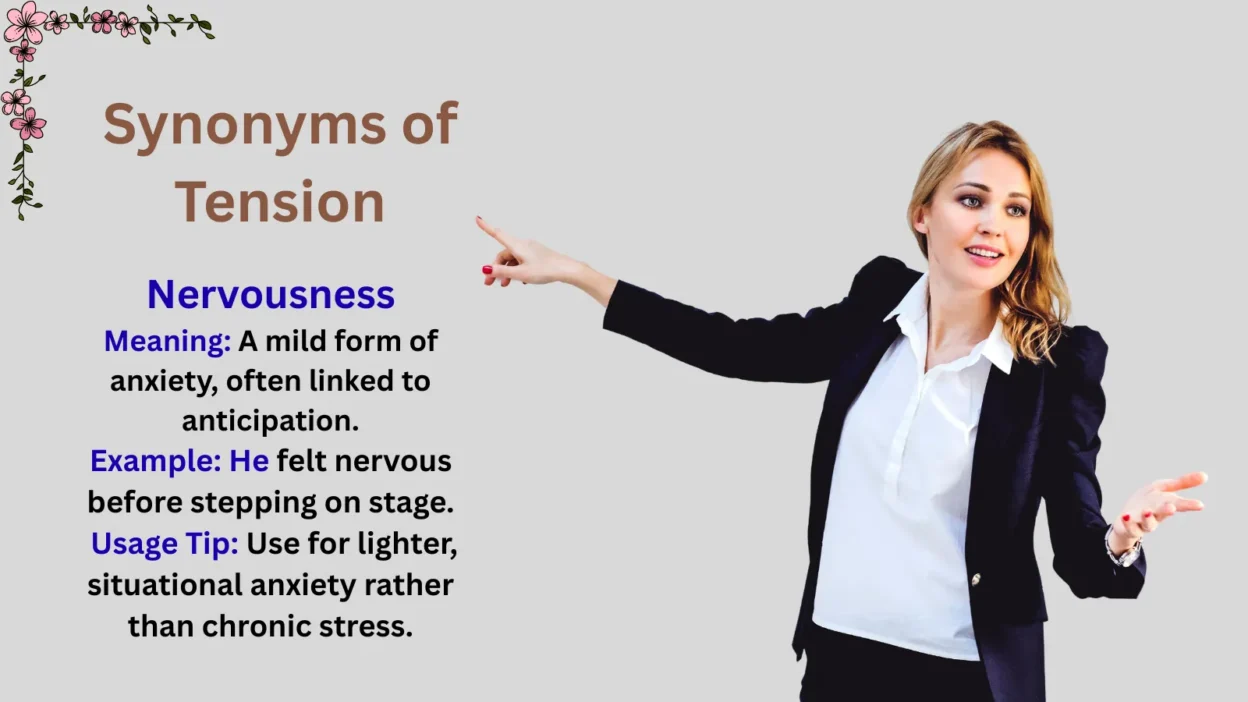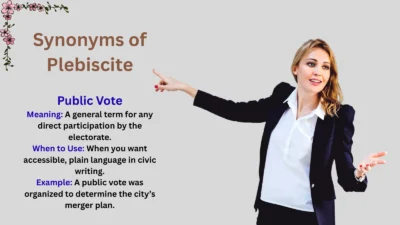Synonyms of tension, such as stress and anxiety, help capture the many shades of mental, emotional, and physical strain. Tension isn’t just stress—it can be nervousness before a presentation, the suspense in a story, or the quiet unease in a tense situation.
Understanding these nuances allows you to choose the perfect word to match the intensity and context of the moment. Using the right synonym not only clarifies your message but also makes your writing or speech more expressive and impactful.
In this article, we’ll explore 30 alternatives to the word tension, complete with definitions, examples, and tips on when to use each one, so you can express pressure, anxiety, or conflict with precision and clarity.
What Does Tension Really Mean?
The word tension typically refers to a state of mental or emotional strain. Imagine the feeling just before an important exam, a suspenseful movie climax, or an apple of discord conversation — that tight, uneasy sensation inside you? That’s tension.
Tension isn’t just about anxiety or stress; it can also imply physical tightness, like the tautness of a stretched rope. Emotionally, tension captures feelings of unease, nervousness, or conflict — but it’s a subtle, often silent pressure rather than an explosive outburst.
When we talk about tension, it’s important to recognize the nuances:
- It can be modest or restrained, meaning the feeling is present but controlled.
- It often involves a kind of anticipation or uncertainty.
- Sometimes it’s underlying rather than overt — a quiet discomfort or apprehension.
- It can be psychological, emotional, or physical.
Because of these layers, tension has many synonyms, each with its own flavor and best-fit context.
Synonyms of Tension: Examples and When to Use Them
1. Stress
Description: A state of mental or emotional strain caused by demanding circumstances.
Example: The stress of the deadline made her restless all night.
When to use: Use stress when the pressure is causing anxiety or health effects; it’s common in everyday and professional settings.
2. Strain
Description: A force causing stretching or pressure, often physical or emotional.
Example: The constant strain of managing two jobs wore him down.
When to use: Appropriate when highlighting prolonged or heavy pressure, especially physical or emotional fatigue.
3. Anxiety
Description: A feeling of worry or nervousness about something uncertain.
Example: Her anxiety about the interview kept her up late.
When to use: Best for emotional or psychological discomfort linked to fear or worry.
4. Pressure
Description: A force applied to something; figuratively, a burden or demand.
Example: The pressure to perform well was overwhelming.
When to use: Use for external demands or expectations that cause tension.
5. Nervousness
Description: A mild form of anxiety, often linked to anticipation.
Example: He felt nervous before stepping on stage.
When to use: Use for lighter, situational anxiety rather than chronic stress.
6. Edginess
Description: A restless, irritable feeling often caused by tension or anticipation.
Example: There was an edginess in the room before the announcement.
When to use: Use when tension manifests as irritability or impatience.
7. Unease
Description: A mild sense of discomfort or worry.
Example: She felt a growing unease about the strange noise outside.
When to use: Use for subtle, often unexplained discomfort.
8. Apprehension
Description: Anxiety or fear that something bad will happen.
Example: The apprehension before the exam was palpable.
When to use: Use when the tension relates to fear of future events.
9. Suspense
Description: A state of excited or anxious uncertainty about what may happen.
Example: The suspense in the thriller kept everyone hooked.
When to use: Use in storytelling or situations with anticipation and uncertainty.
10. Restlessness
Description: An inability to relax due to nervousness or boredom.
Example: His restlessness showed during the long meeting.
When to use: Use when tension causes physical or mental agitation.
11. Agitation
Description: A state of nervous excitement or disturbance.
Example: The news caused agitation among the crowd.
When to use: Use when tension turns into a visible emotional disturbance.
12. Fretfulness
Description: Being visibly worried or anxious about something small.
Example: The child’s fretfulness made bedtime difficult.
When to use: Use for minor, persistent worry or irritation.
13. Tightness
Description: Physical or emotional feeling of being tense or constricted.
Example: She felt tightness in her chest during the argument.
When to use: Use for physical symptoms or metaphorical emotional states.
14. Conflict
Description: A serious disagreement or argument causing tension.
Example: The conflict between the teams heightened tension.
When to use: Use when tension arises from opposing forces or ideas.
15. Discord
Description: Lack of harmony or agreement, causing tension.
Example: Discord in the group made collaboration difficult.
When to use: Use in social or musical contexts where harmony is disrupted.
16. Struggle
Description: Effort against opposition or difficulty, often causing tension.
Example: The struggle to meet expectations created stress.
When to use: Use when tension arises from an ongoing effort or challenge.
17. Frustration
Description: Feeling annoyed or upset because of the inability to change or achieve something.
Example: He felt frustration at the slow progress.
When to use: Use when tension comes from obstacles or unmet goals.
18. Pressure cooker
Description: Metaphor for an intense and stressful situation.
Example: The office felt like a pressure cooker during tax season.
When to use: Use in informal contexts to describe extreme tension.
19. Animosity
Description: Strong hostility or resentment.
Example: There was animosity between the rival factions.
When to use: Use when tension is fueled by deep-seated dislike.
20. Uneasiness
Description: Feeling uncomfortable or anxious.
Example: A sense of uneasiness filled the quiet room.
When to use: Use for mild, often subconscious discomfort.
21. Jitters
Description: Nervous excitement or anxiety.
Example: She had the jitters before the presentation.
When to use: Use informally for temporary nervous tension.
22. Trepidation
Description: Fear or anxiety about something that may happen.
Example: He approached the stage with trepidation.
When to use: Use for cautious or fearful anticipation.
23. Pressure point
Description: A critical moment or issue causing stress.
Example: The negotiations reached a pressure point.
When to use: Use to highlight a key source of tension.
24. Stress point
Description: Similar to a pressure point, a moment or factor causing stress.
Example: The last-minute changes were the main stress point.
When to use: Use in technical or everyday contexts.
25. Tension arc
Description: The buildup and release of tension, often in storytelling.
Example: The tension arc in the novel kept readers engaged.
When to use: Use in creative writing or dramatic discussions.
26. Pressure build-up
Description: Gradual increase of tension or stress.
Example: The pressure build-up before the deadline was intense.
When to use: Use to describe accumulating tension.
27. Tenseness
Description: The quality of being tense or rigid.
Example: The tenseness in the room was noticeable.
When to use: Use to describe an overall atmosphere of tension.
28. Edgy atmosphere
Description: A mood characterized by nervousness or irritability.
Example: There was an edgy atmosphere before the exam results.
When to use: Use for describing collective feelings in groups or places.
29. Volatility
Description: Tendency to change rapidly and unpredictably, causing tension.
Example: The volatile political climate increased tension.
When to use: Use when tension is unstable or likely to erupt.
30. Nervous tension
Description: Anxiety that creates physical or emotional strain.
Example: The nervous tension made her hands shake.
When to use: Use for physical symptoms caused by mental anxiety.
How to Choose the Right Synonym for Tension
Choosing the best synonym depends on the tone, context, and intensity of the tension you want to describe.
- For mild, situational discomfort, words like nervousness, unease, or jitters work well.
- For intense, prolonged pressure, go for strain, stress, or pressure build-up.
- When tension involves fear or anticipation, choose apprehension, trepidation, or suspense.
- For conflict or hostility, use conflict, discord, or animosity.
- When tension causes visible agitation or irritability, pick edginess, agitation, or restlessness.
- To describe physical symptoms of tension, tightness or nervous tension fits best.
- For dramatic or creative contexts, tension arc or suspense are ideal.
Also, consider the emotional color: some words carry a more clinical or formal tone (strain, stress), while others are casual or expressive (jitters, edginess).
Cultural note: In some cultures, words that imply conflict or hostility (like animosity or discord) may be avoided in polite conversation, while unease or apprehension might be preferred as more subtle and respectful expressions of tension.
Conclusion :
Synonyms of tension help capture the many shades of unease, stress, and emotional or physical strain. By choosing the right word, you can convey these nuances clearly and make your writing or speech more precise and engaging.
Whether describing nervous jitters before a presentation, the strain of a difficult task, or the suspense in a story, these 30 alternatives give you the flexibility to match tone, context, and intensity perfectly.



